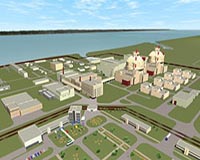 |
San Diego, California (AFP) Feb 19, 2010 Three European countries will within 15 years begin disposing of their nuclear waste deep underground, even though the public is not solidly behind the move, officials said here Friday. In Finland, a deep geological repository where spent nuclear fuel will be disposed of is due to come onstream in 2020, said experts who addressed a forum at the annual meeting of the American Association for the Advancement of Science (AAAS). Sweden will follow three years after its Nordic neighbor, and "France plans to start operating a deep geological repository for vitrified high-level waste from reprocessing in 2025," Roland Schenkel, deputy director general of the European Commission's Joint Research Center, said. France, along with Britain, Japan and Russia, currently reprocess their nuclear waste and then hold it in an interim storage facility, before the "intended disposal in deep geological repositories," which is the final resting place for high-level radioactive waste, Schenkel said. But according to Allison Macfarlane of George Mason University in Virginia and Klaus Luetzenkirchen of the Joint Research Center in Karlsruhe, Germany, storing nuclear waste directly in deep underground repositories without reprocessing it is the best and safest way to go. Reprocessing is expensive, said Macfarlane, adding: "Geologic repositories are generally agreed to be the best solution for high-level nuclear waste." Luetzenkirchen said: "It's easier to safeguard nuclear waste that is all underground." For the one in five people in Sweden who are against having a such a repository in their town or region, the experts had few words of reassurance. "We can never say it is completely safe. If we start to speak like that, sooner or later, people will understand we are not telling the truth," said Claes Thegerstroem of Sweden's Nuclear Fuel and Waste Management group. "But we can say, of all the options, this is the best option. Everything else is less safe," said Thegerstroem. Roland Schenkel of the European Commission said there is a "growing consensus both in Europe and in other parts of the world that deep geological disposal is the most appropriate solution for long-term management of spent fuel, high-level waste, and other long-lived radioactive wastes." Other countries in the EU, where some 145 reactors were operating in 15 countries as of 2007, and nearly one third of the electricity consumed is produced by nuclear power, are also expected to unveil plans in the coming decades for deep geological nuclear waste repositories. The forum on what to do with the growing volume of nuclear waste produced largely by power plants around the world came shortly after US President Barack Obama announced plans to build the first new nuclear power plants on US soil in nearly 30 years. On the same day Obama made the announcement, the Department of Energy was granted a stay on license applications for the controversial Yucca Mountain nuclear waste depository in the state of Nevada, which would have been the first deep geologic repository for high-level nuclear waste in the United States. US Energy Secretary Steven Chu in late January tasked a high-level commission with finding a solution for managing used nuclear fuel and weapons waste in the United States. Chu excluded the panel from considering the Yucca Mountain site, which is not only sacred ground to some native Americans but also sits in a part of the United States that has "active earthquakes and volcanoes," Macfarlane said.
Share This Article With Planet Earth
Related Links Nuclear Power News - Nuclear Science, Nuclear Technology Powering The World in the 21st Century at Energy-Daily.com
 Russia says ready to help finance Bulgaria nuclear plant
Russia says ready to help finance Bulgaria nuclear plantSofia (AFP) Feb 19, 2010 Russia is ready to finance the construction of a new nuclear plant in Bulgaria by up to 2.0 billion euros (2.7 billion dollars) until a new strategic investor can be found, officials said here Friday. "We are ready to provide the necessary investment in order for construction to continue," said the head of Russia's state atomic energy corporation Rosatom, Sergey Kiriyenko, after talks with ... read more |
|
| The content herein, unless otherwise known to be public domain, are Copyright 1995-2010 - SpaceDaily. AFP and UPI Wire Stories are copyright Agence France-Presse and United Press International. ESA Portal Reports are copyright European Space Agency. All NASA sourced material is public domain. Additional copyrights may apply in whole or part to other bona fide parties. Advertising does not imply endorsement,agreement or approval of any opinions, statements or information provided by SpaceDaily on any Web page published or hosted by SpaceDaily. Privacy Statement |